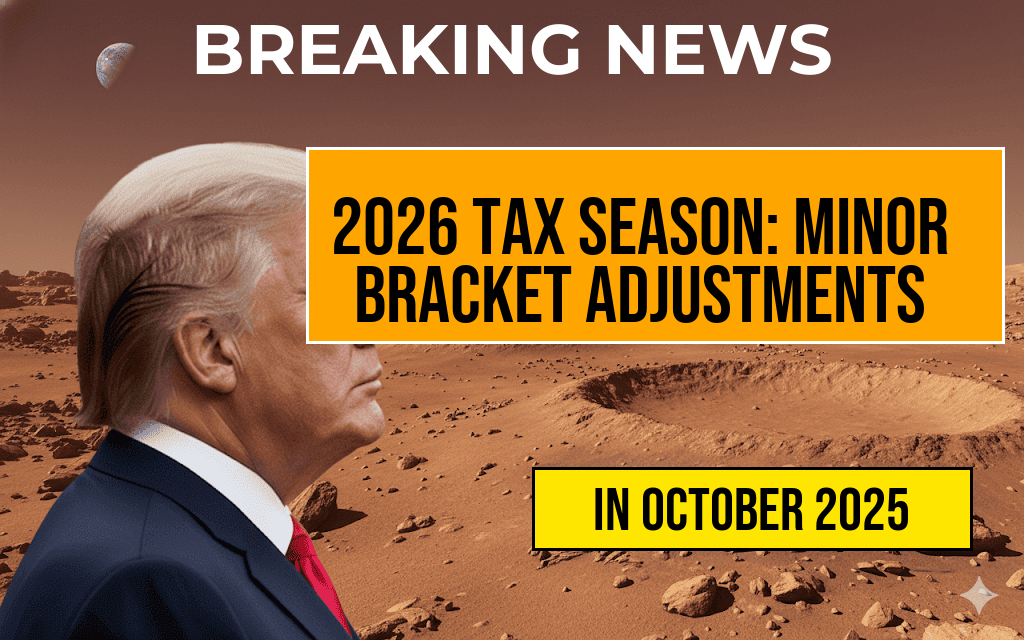As tax season approaches in 2026, taxpayers may benefit from minor adjustments to income tax brackets forecasted by Bloomberg. These adjustments, aimed at keeping pace with inflation, could lead to significant savings for individuals and families across various income levels. According to economic analysts, such changes are not merely incremental; they can impact overall tax liabilities, potentially saving taxpayers hundreds of dollars. This adjustment comes at a time when many are seeking relief from rising living costs, making it critical for taxpayers to understand how these changes can affect their financial planning.
Understanding the Tax Bracket Adjustments
The adjustments to the federal income tax brackets are a response to ongoing inflationary pressures affecting American households. The IRS periodically updates these brackets to reflect changes in the cost of living, which is calculated using the Consumer Price Index (CPI). In 2026, these adjustments are expected to be relatively minor but consequential for many taxpayers.
Projected Changes for 2026
| Filing Status | 2025 Rate | 2026 Rate (Projected) |
|---|---|---|
| Single | 10% up to $10,275 | 10% up to $10,550 |
| Married Filing Jointly | 10% up to $20,550 | 10% up to $21,100 |
| Head of Household | 10% up to $14,650 | 10% up to $15,000 |
These adjustments may appear small, but they can lead to meaningful savings for many taxpayers. For example, a single filer earning $50,000 in 2026 will see a slight reduction in their taxable income due to the increased threshold.
Who Will Benefit Most?
The most pronounced benefits will likely be felt by middle-income earners. As the inflation rate fluctuates, the ability to push more income into lower tax brackets can result in substantial savings. Households earning between $40,000 and $100,000, particularly those with additional deductions or credits, may find themselves in a more favorable tax situation as a result of these adjustments.
- Single Filers: With the proposed adjustments, single taxpayers may find it easier to manage their tax burden.
- Families: Couples filing jointly will also experience relief, potentially allowing them to retain more of their income.
- Head of Household: This filing status will see its own set of benefits, especially for single parents or custodial parents.
Planning Ahead for Tax Savings
As taxpayers prepare for the 2026 tax season, it is essential to consider how these adjustments can fit into broader financial planning. Taxpayers should take the time to review their income, expenses, and possible deductions to maximize their savings. Consulting with a tax professional may also be beneficial, as they can provide personalized advice based on individual circumstances.
Impact of Inflation and Future Projections
The ongoing economic climate, characterized by inflation, will continue to influence tax policies. According to Wikipedia, inflation affects purchasing power and economic stability, making tax adjustments necessary to protect taxpayers. Future projections indicate that if inflation persists, further adjustments may be needed in the coming years, impacting how individuals and families plan their finances.
Key Takeaways
- Minor adjustments to tax brackets in 2026 could save taxpayers hundreds.
- Middle-income earners are expected to benefit the most from these changes.
- Taxpayers should proactively assess their financial situation and seek professional advice if needed.
As the 2026 tax season approaches, staying informed about these changes can empower taxpayers, enabling them to make strategic decisions that enhance their financial wellbeing. With careful planning, the minor adjustments to tax brackets can lead to substantial benefits for those who are prepared.
Frequently Asked Questions
What are the expected bracket adjustments for Tax Season 2026?
Bloomberg forecasts that there will be minor bracket adjustments in Tax Season 2026, which could lead to tax savings for many individuals and families.
How can these minor adjustments affect my tax return?
The minor adjustments to tax brackets may lower your effective tax rate, potentially saving you hundreds of dollars on your tax return.
Who is most likely to benefit from these tax changes?
Individuals and families in the middle-income brackets are expected to benefit the most from these tax changes, as the adjustments aim to alleviate some financial burden.
When will the 2026 tax changes take effect?
The 2026 tax changes will take effect for the tax year 2026, meaning they will be reflected in tax returns filed in early 2027.
What should I do to prepare for the upcoming tax season?
To prepare for the upcoming tax season, it’s advisable to stay informed about the changes, organize your financial documents, and consider consulting a tax professional for personalized advice.






